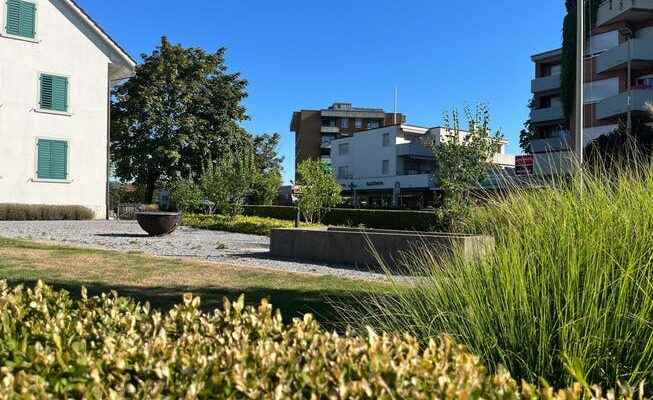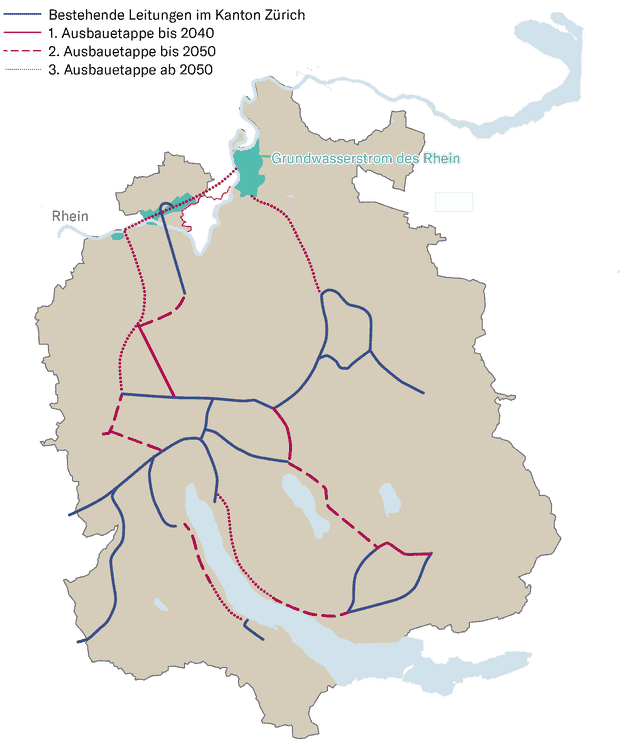Due to the persistent drought, Zurich communities are calling for water consumption to be reduced. Dietlikon does this “out of solidarity”.
No more water flows here: a shut down well in Dietlikon.
As early as nine o’clock in the morning on Thursday, the sun is beating down mercilessly from the sky, and at the Dietlikon train station the passengers are waiting in the shade for the train. Record temperatures are expected, once again. Will it be 35 degrees, maybe even 36 or 37 degrees?
You can cool down in the small station shop, where the air conditioning is humming. A few meters from the entrance there is a small stone fountain that has seen better days. With its matt mosaic tiles, it has the charm of a swimming pool. But there is no water here any more: the municipality of Dietlikon has turned off all eight wells with one exception and sent out an appeal to the media: “Save water!” The population is urged to stop washing cars, not filling up swimming pools and, if possible, not watering green spaces.
The ongoing drought has led to the groundwater level being low and springs only supplying a modest amount of water, the Dietliker municipal utilities reported. At the same time, consumption has increased.
Dietlikon is not the only community whose fountains are no longer bubbling. Urdorf has also turned off its wells, as have Illnau-Effretikon and Kloten, accompanied by the appeal to save water.
When it comes to water consumption, Dietlikon is on top. The average consumption per capita and day in Switzerland is 142 liters, in Dietlikon it is 235 liters – “including trade”. The Coca-Cola bottling plant, the only one in Switzerland, contributes to the high consumption. The municipality therefore has no influence whatsoever on a considerable part of the water consumption. The indoor and outdoor pools are also open as normal.
Nevertheless, a flyer with tips has been posted on the Dietlikon website: For example, it is recommended to only run the washing machine full, turn off the tap when brushing your teeth or wash salad in a bowl rather than under the running water. “Every adjustable water source that is bubbling up unused is superfluous in the truest sense of the word,” says the flyer.
Heavy rainfall is still not to be expected. So is the water running out?
Lake Zurich is the largest reserve
Around 380 million liters of drinking water are consumed in the canton of Zurich every day, and up to 610 million on peak days. Lake Zurich forms the largest drinking water reserve, another 40 percent comes from various groundwater streams and 20 percent is fed from spring water.
The municipalities in the canton of Zurich are responsible for the drinking water supply themselves. But the cantonal drinking water network ensures that communities with scarce resources have enough water available even at peak times. A comprehensive pipeline network runs through the canton; it ensures that a municipality still has sufficient drinking water available even in the event of a disruption. The network is to be expanded in the coming decades.
In addition, the communities have come together to form group water supplies to prevent bottlenecks. In other words, it is actually not necessary to save water. As the canton writes on its website, bottlenecks can only occur in remote hamlets that are only supplied with spring water.
Dietlikon, for example, is affiliated with the Lattenbuck group water supply. This draws its water from eleven groundwater pumping stations and five spring systems. And up to 8000 cubic meters per day can be obtained from the Zweckverband Vororte und Glattal (GVG).
20,000 liters are saved every day
There are communities that call for savings because they no longer have enough spring or ground water of their own and therefore have to buy water. That is not the case in Dietlikon, says the responsible municipal councilor Cristina Cortellini.
You have not exhausted the water supply at the GVG and are therefore not dependent on an additional purchase. So if there is enough water in Dietlikon: why are the wells turned off? Follow the GVG’s call to save water “out of solidarity,” says Cortellini. However, the group water supply Lattenbuck has the finances in mind: It also calls for water saving “so that the budgeted expenses can be met”.
“We want to sensitize the population. Drinking water is a precious commodity, you have to treat it with respect,” says Cortellini. She doesn’t just see the current drought as a problem. In recent years, the amount of precipitation has decreased. The groundwater level has also dropped accordingly. “Now in the summer, a thunderstorm is not enough to fill up the storage tanks. The rain doesn’t seep deep enough.” With the wells shut down, around 20,000 liters of water can be saved in Dietlikon per day – that’s how much a person uses on average in 140 days.
Because there is no sustained rainfall in sight, the measure will remain in place until further notice. There is one exception. The fountain in the Hardwald is running – so that the day-trippers can refresh themselves.

